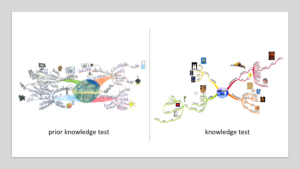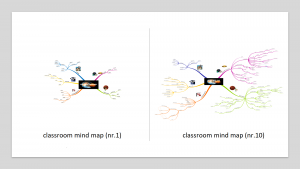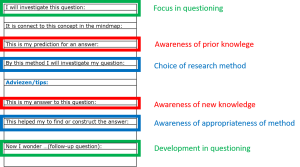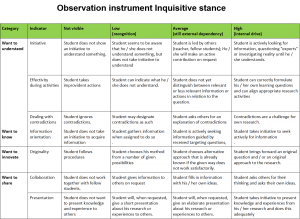Principles of Phase 5: Evaluation

The main objective of the scenario is to support students to build collective knowledge based upon their own individual learning questions.
Mindmaps are used in the scenario to visualize student knowledge development. This allows assessment for learning in contrast to assessment of learning.
Next to evaluation of cognitive development, various skills can be evaluated when working with the scenario, such as information skills, research skills, and metacognitive skills.
Finally, the development of students’ inquisitive stance attitude can also be included in the (self) evaluation of each project.
Steps of Phase 5
Evaluation of individual development

Compare prior knowledge to constructed knowledge
When completed the scenario all students construct an individual mindmap as post-test.
By comparing pretest with the posttest aspects of the cognitive development become apparent.
Practical suggestions
Evaluation of collective knowledge

Compare initial classroom mind map to final classroom mind map
Evaluate if the objectives, which were set in the Teachers Mind Map, were attained by comparing it with the development of the Classroom Mind Map.
Students can evaluate the collective knowledge construction by comparing the first with last version of the Classroom Mind Map.
Practical suggestions
Evaluation of various skills

Evaluate several skills by means of question-worksheet
Teachers and students can evaluate together several skills imbedded in the question-worksheet:
1) cognitive skills such as awareness of assumptions and conceptual thinking (green)
2) information-seeking skills such as selecting and evaluating resources (red)
3) meta cognitive skills such as setting and evaluating objectives (blue)
Practical suggestions
Evaluation of inquisitive stance

Example of part of observation matrix
The inquisitive stance of students can also be evaluated at the end of the project. Indicators for the inquisitive stance are: take initiative, act purposefully, deal with contradictions, information focus, originality, and willingness to share.
Practical suggestions





